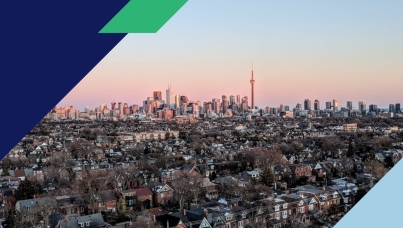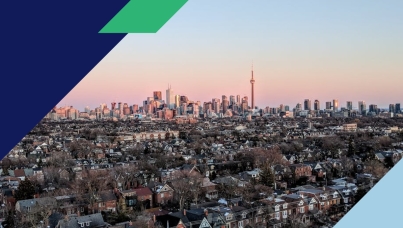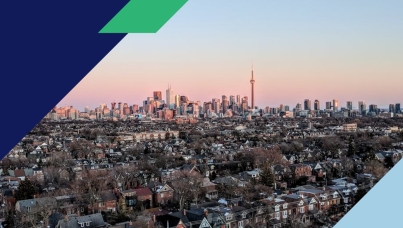Liberals And Conservatives Tied In Voter Support, But Tories Have Edge In Seats
But while declaring a winner in terms of popular vote is difficult, what is close to certain is that no party will emerge from this election with a majority of seats. But it does appear as though the Conservatives are set to win the most seats of any party.
An Ipsos-Reid seat model prepared exclusively for CTV and The Globe and Mail, shows that if a vote were held tomorrow, the Conservatives would have a potential of 115-119 seats, the Liberals would have a potential of 99-103 seats, the NDP would have a potential of 22-26 seats, and the Bloc Quebecois would have a potential of 64-68 seats.
In this most recent national poll, conducted from Monday night June 21st to Wednesday night June 23rd, 2004, the Liberal Party comes in with 32% of decided voter support (down 2 points), while the Conservative Party now holds 31% of the national decided vote (up 3 points). In the key battleground province of Ontario the Liberals (38%, down 4 points) have only a slight lead over the Conservatives (34%, up 4 points).
Nationally, the New Democratic Party (17%, up one point) and the Green Party (6%, unchanged) continue to hold steady.
The Bloc Quebecois dominate the federal political landscape in Quebec (48%, down 5 points) - and now hold a 19 point lead over the Liberal Party (29%, up 6 points). The Bloc, nationally, is pegged at 12% of decided vote support (unchanged).
Regardless of their political inclinations, half of Canadians (49%) believe that the Liberals will win this election and form Canada's next government - this represents an impressive 23 point drop from the 72% who believed the Liberals would win the election just prior to the writ (May 11-17th survey). Conversely, 35% of Canadians believe the Conservatives will win this election and form the next government (up 17 points from 18%).
These are the findings of an Ipsos-Reid/CTV/Globe and Mail poll conducted from June 21st to June 23rd, 2004. For the survey, a representative randomly selected sample of 2000 adult Canadians was interviewed by telephone. With a sample of this size, the results are considered accurate to within 1772.2 percentage points, 19 times out of 20, of what they would have been had the entire adult Canadian population been polled. The margin of error will be larger within regions and for other sub-groupings of the survey population. These data were weighted to ensure the sample's regional and age/sex composition reflects that of the actual Canadian population according to the 2001Census data.
Liberals (32%) and Conservatives (31%) Neck-And-Neck...
If a federal election were held tomorrow, Paul Martin and the Liberal Party would garner 32% of the decided vote (down 2 points), while Stephen Harper and the Conservative Party would garner 31% of the decided vote (up 3 points). Jack Layton and the New Democratic Party (17%, up 1 point) and Jim Harris and the Green Party (6%, unchanged) hold steady in this national poll, while 2% of decided voters would cast their support for some "other" party.
In the province of Quebec, the Bloc Quebecois attracts 48% of decided votes (down 5 points), and lead the Liberals (29%, up 6 points) by 19 points. The Bloc, nationally, is pegged at 12% of decided vote support (unchanged).
Among all Canadians, 7% are undecided or would not vote if an election were held tomorrow (down 9 points).
- In Ontario, the Liberals attract 38% of the decided vote (down 4 points) and are up 4 points on the Conservatives (34%, up 4 points). The NDP continues to hold steady at 20% of decided voter support (unchanged), and the Green Party trails very distantly with 6% of decided voter support (unchanged). 183
- In Quebec, a 19 point margin separates the Bloc Quebecois (48%, down 5 points) from the Liberals (29%, up 6 points). The Conservatives (9%, up 1 point), the NDP (5%, down 4 points), and the Green Party (5%, up 2 points) register lower on the federal radar screen in this province. 183
- In British Columbia, the Conservatives (44%, up 8 points) are surging and now lead the Liberals (24%, down 8 points) by 20 points. The NDP has rebounded (22%, up 4 points) to earlier levels of support, while the Green Party (8%, unchanged) remains static. 183
- In Alberta, the Conservatives (59%, unchanged) continue to dominate with a 39 point lead over the Liberals (20%, up 3 points). NDP decided vote support sits at 11% (unchanged), as the Green Party trails further behind with 6% of decided vote support (down 1 point). 183
- In Saskatchewan/Manitoba the Conservatives (36%, down 1 point) and the Liberals (32%, down 1 point) are running closely, with the NDP (25%, up 8 points) a little further back. The Green Party attracts 5% of the decided vote (down 2 points). 183
- In Atlantic Canada the lead continues to move back and forth, with the Liberals (44%, up 7 points) now leading the NDP (26%, up 11 points) and Conservatives (23%, down 18 points). The Green Party registers with 7% of the decided vote (up 5 points).
Regardless Of Vote Intentions, Half Of Canadians (49%) Believe Liberals Will Win Election Vs. 35% Who Believe Conservatives Will Win...
Regardless of their political inclinations, half of Canadians (49%) believe that the Liberals will win this election and form Canada's next government - down 23 points from 72% who believed the Liberals would win the election just prior to the writ (May 11-17th survey). Conversely, 35% of Canadians believe the Conservatives will win this election and form the next government (up 17 points from 18%). Only 4% of Canadians believe the NDP will win this election and form Canada's next government (unchanged), and 2% believe some "other" party will win. One in ten Canadians (9%) "don't know" who they think will win this election.
-
183
- Agreement that the Liberals will win this election and form the next government is highest in Atlantic Canada (55%), followed by Quebec (53%), Saskatchewan/Manitoba (51%), Ontario (49%), British Columbia (46%), and Alberta (37%). 183
- Among Liberal supporters, 80% believe the Liberals will win the up-coming election and form Canada's next government. In comparison, half of NDP supporters (49%), 41% of Bloc Quebecois supporters, and 24% of Conservative supporters believe the Liberals will this election.
- Agreement that the Conservatives will win this election and form the next government is highest in Alberta (53%), followed by British Columbia (44%), Ontario (34%), Quebec (30%) and Saskatchewan/Manitoba (30%), and Atlantic Canada (26%). 183
- Among Conservative supporters, 69% believe the Conservatives will win this election and form the next government. In comparison, 41% of Bloc Quebecois supporters, 26% of NDP supporters, and 12% of Liberal supporters believe the Conservatives will win this election. 183
- Agreement that the NDP will win this election and form the next government is low throughout the country -- Atlantic Canada (7%), Ontario (5%), British Columbia (4%), Alberta (4%), Saskatchewan/Manitoba (4%), and Quebec (2%). 183
- One in ten NDP supporters (12%) believe the NDP will win this election, compared to 2% of Conservative, Liberal, and Bloc Quebecois supporters.
Seat Projection Model Suggests Conservatives Will Win Plurality Of Seats (115-119), Liberals (99-103), NDP (22-26), Bloc Quebecois (64-68)
In an exclusive seat projection model provided to CTV and The Globe and Mail, if a vote were held tomorrow, the Conservatives would have a potential of 115-119 seats, the Liberals would have a potential of 99-103 seats, the NDP would have a potential of 22-26 seats, and the Bloc Quebecois would have a potential of 64-68 seats. In order to achieve a majority government, a party needs a minimum of 155 seats in the House of Commons.
For a full explantion of the seat model please visit: Turning Votes Into Seats
Please open the attached PDF to view the factum and detailed tables.
-30-
For more information on this news release, please contact:
Darrell Bricker
President & COO
Ipsos-Reid Public Affairs
(416) 324-2900



